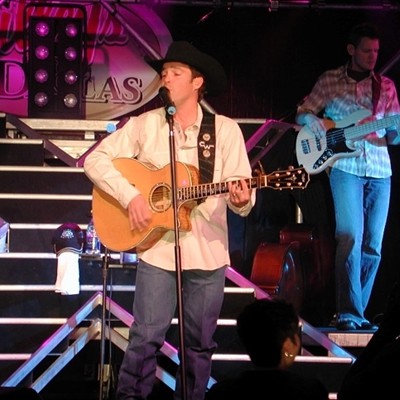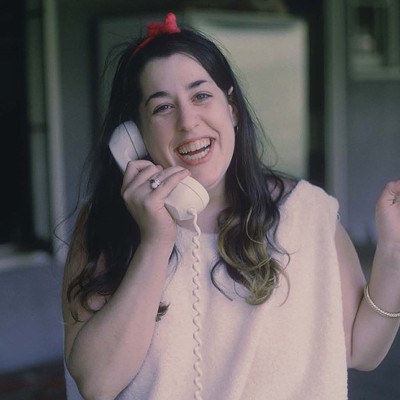In 1949, Hank Williams’ signature tune “Lovesick Blues” was at the top of virtually every music chart in America. While the song spent a few weeks at No. 1 in Houston, in a matter of weeks ole Hank was knocked from the top slot by a relative newcomer on the local honky-tonk scene, Smilin’ Jerry Jericho, and his tune “Why Don’t You Haul Off and Love Me.”
But while Jericho, who is honky-tonk legend Johnny Bush’s uncle, was a mainstay of the rowdy Houston scene for more than two decades, his career wasn’t big enough to get him listed in The Handbook of Texas Music. However, historian and prolific liner-notes writer Andrew Brown notes in his blog that Jericho was “a star in Texas.” But unlike George Jones, Claude Gray, Sleepy LaBeef, and Moon Mullican, among others, Jericho was never able to make a national breakout in spite of many local/regional recordings and a handful of local hits.
Early in his career, Jericho served as vocalist for Ben Christian’s Texas Cowboys, who racked up a local hit with a rowdy tune called “I’m Ragged But I’m Right.” Cleaned up a bit lyrically, it was also recorded by George Jones in 1957, but Jericho’s version is about as down and dirty as a honky-tonk song has ever been. Beginning in 1948, Christian and Jericho headlined shows three nights per week at Jerry Irby’s Texas Corral, another 1,000-seat club in south Houston. The other nights were taken up by Floyd Tillman and Leon Payne.
As for why, in spite of 20-plus years of regional popularity, Jericho never became a national star like Gray, Jones, or LaBeef, Bush — who drummed in Jericho’s band in the late 1950s — surmises his uncle “didn’t keep up with the times.”
“He didn’t stay current in his choice of material, things like that,” Bush relates. “He also wrote some of the songs he cut, but I wouldn’t call him a really gifted writer like Ted Daffan, Leon Payne, or Floyd Tillman, his contemporaries in Houston.”
“Another factor was he didn’t really want to leave Houston,” adds Bush. “He had a bunch of offers to be part of the Louisiana Hayride, but he didn’t want to do it because they didn’t pay you anything. The people that ran the Hayride thought the exposure you got being on the show and on the weekly radio program was enough compensation because you could then go play shows and advertise yourself that way, just like the Grand Ole Opry worked. That’s how Elvis and Hank and others got jump-started, but Jerry had a nice house here and a family and he just wouldn’t do it for no pay. He had plenty of work.”
Bush says Jericho was almost the opposite of Hank Locklin, a fellow country star in Houston at the time whose ambitions stretched beyond the city. Once Locklin began appearing on the Louisiana Hayride, according to Bush, he made the music-biz connections Jericho didn’t and eventually signed a contract with RCA.
“Jerry was sort of the opposite of Hank Locklin,” Bush explains. “Once Hank built up a real following here, he still refused to be localized. He worked the Hayride and recorded for 4-Star, but he made some moves and eventually got signed to RCA and went national.”
“Another thing that held him back was working with Bill McCall and Bill’s 4-Star label, which was based in Los Angeles,” he adds. “They had quite a roster, acts like Maddox Brothers and Rose, Webb Pierce, and T. Texas Tyler, but they didn’t pay much. Bill believed if you cut a record and could get radio play, that radio play would assure you of people coming to your gigs, and he thought that was all the artist should get off the recordings.”
4-Star’s biggest coup would come in 1957, when it began putting out sides by Patsy Cline. As Bush explains, smaller labels like 4-Star could discover and break talent, but it was hard to keep.
“That was another problem Jerry had,” says Bush, who played drums on the first session Mickey Gilley ever did. “4-Star was competing for radio time and sales with RCA, Decca, Columbia, and Capitol, and it just didn’t have that kind of reach and muscle. So some of Jerry’s records probably never got the radio attention they deserved.”
While Claude Gray holds the honor of recording the first Willie hit, “Family Bible,” in 1959, Jericho cut an obscure Nelson tune titled “What Right Have I” in 1960, according to Bush. Willie never actually released the song, if he ever even recorded it.
“My parents divorced and I had moved in with Jerry and my aunt Adele when I was about 16. My aunt was so angry,” Bush laughs, “because Jerry traded her old Buick to Willie for half a dozen songs. I don’t know what the other songs were, and I don’t know if Jerry ever recorded or used any of the others. But that was a sore spot around the house for a while.”
At his uncle’s encouragement, Bush and his brother Gene had actually been appearing as a Homer and Jethro-type duo on Jericho’s Blue Jamboree radio program while still at Houston’s Hamilton Junior High, although Bush stopped doing music for a while when his brother gave up interest.
“I quit school and went to work when I turned 16,” Bush recalls. “I’d been roughnecking but was between rigs, so Jerry asked me if I’d drive him to a gig in San Antonio. I guess you could say I was sort of his roadie or just his handyman. I’d carry his stuff, do whatever he needed done. But that was how I learned the business. And how I learned about drinking. Driving with Jerry and later playing in his band was my introduction to the honky-tonk world.”
Jericho passed away in 1993, while Bush went on to write outlaw honky-tonk standard “Whiskey River” — the song Willie Nelson has used to open his concerts for decades — and today has attained legend status. Sadly and perhaps unjustly, Smilin’ Jerry Jericho is little more than a vaguely remembered talent from a bygone golden age of country music in Houston.
Support Us
Houston's independent source of
local news and culture
account
- Welcome,
Insider - Login
- My Account
- My Newsletters
- Contribute
- Contact Us
- Sign out
[
{
"name": "Related Stories / Support Us Combo",
"component": "11591218",
"insertPoint": "4",
"requiredCountToDisplay": "4"
},{
"name": "Air - Billboard - Inline Content",
"component": "11591214",
"insertPoint": "2/3",
"requiredCountToDisplay": "7"
},{
"name": "R1 - Beta - Mobile Only",
"component": "12287027",
"insertPoint": "8",
"requiredCountToDisplay": "8"
},{
"name": "Air - MediumRectangle - Inline Content - Mobile Display Size 2",
"component": "11591215",
"insertPoint": "12",
"requiredCountToDisplay": "12"
},{
"name": "Air - MediumRectangle - Inline Content - Mobile Display Size 2",
"component": "11591215",
"insertPoint": "4th",
"startingPoint": "16",
"requiredCountToDisplay": "12"
}
,{
"name": "RevContent - In Article",
"component": "12527128",
"insertPoint": "3/5",
"requiredCountToDisplay": "5"
}
]
KEEP THE HOUSTON PRESS FREE...
Since we started the Houston Press, it has been defined as the free, independent voice of Houston, and we'd like to keep it that way. With local media under siege, it's more important than ever for us to rally support behind funding our local journalism. You can help by participating in our "I Support" program, allowing us to keep offering readers access to our incisive coverage of local news, food and culture with no paywalls.
William Michael Smith
Trending Music
- Blackberry Smoke Ignites Some Sizzling Southern Rock
- Country Kicks Off Houston Summer Concert Season in a Big Way
- A Mother and a "Mama"—Cass Elliot Remembered by Her Daughter
-
Sponsored Content From: [%sponsoredBy%]
[%title%]

Don't Miss Out
SIGN UP for the latest
Music
news, free stuff and more!
Become a member to support the independent voice of Houston
and help keep the future of the Houston Press FREE
Use of this website constitutes acceptance of our
terms of use,
our cookies policy, and our
privacy policy
The Houston Press may earn a portion of sales from products & services purchased through links on our site from our
affiliate partners.
©2024
Houston Press, LP. All rights reserved.




